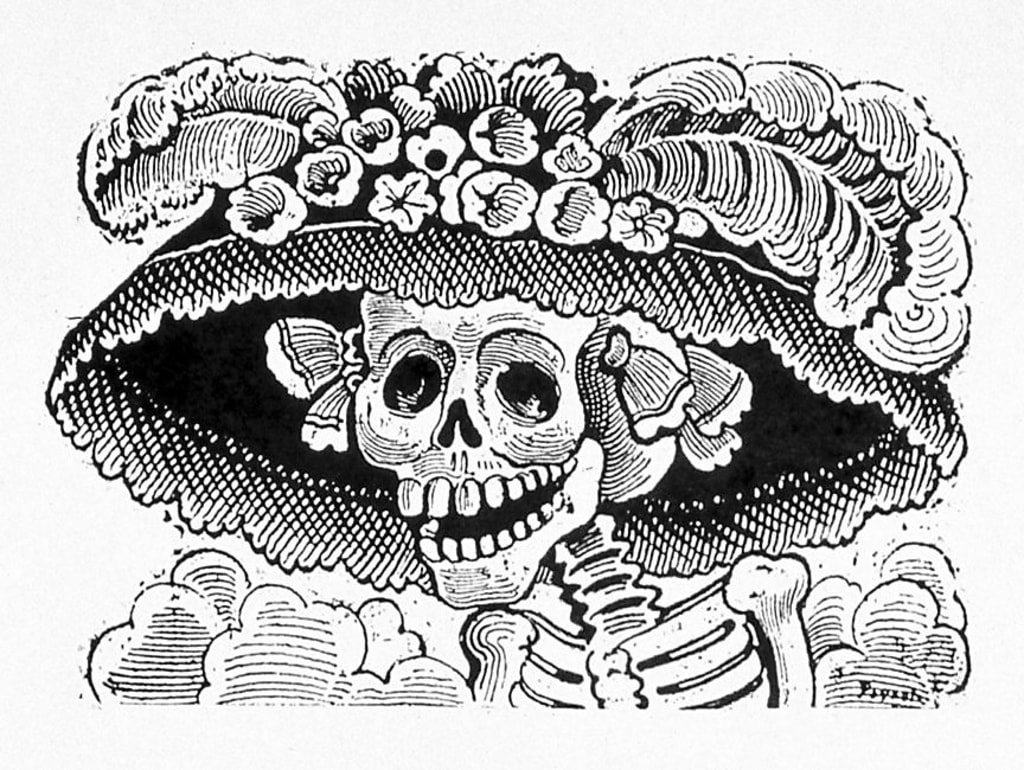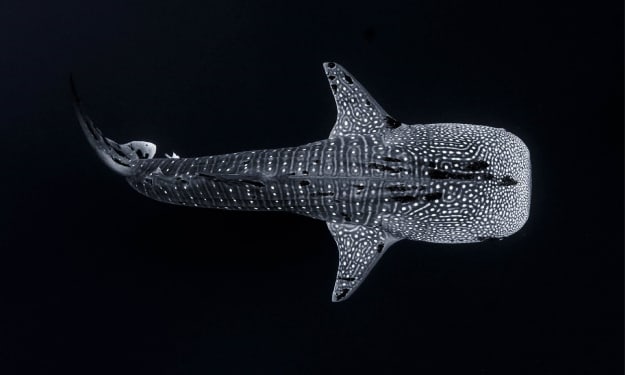A Marigold For Your Thoughts
"A culture is not a place, it is a people."

Arturo frowned at the half-built ofrenda. At present, it was little more than a table with a white cloth covering it. Several unlit candles rested on its surface, and the house was alive with the sounds of other preparations being made.
Unable to stomach being in the room any longer, Arturo stalked towards the kitchen. The giggles of his younger sisters floated out as he approached. Peeking in, he saw Gabriela and Araceli sitting at the small workbench in the corner, happily snipping away as they made some papel picado. Arturo’s frown deepened.
Their mother was at the kitchen counter, humming to herself as she kneaded the dough that would be used for the pan de muerto. She turned to say something to the girls but stopped as she caught sight of Arturo. “Que pasa, mi hijito?”
Arturo shrugged. “Why are you making an ofrenda?”
Mamá tilted her head, confused. “It’s almost Día de los Muertos.”
“We’re not in México anymore, mamá. There’s no point.”
The girls quieted, staring at Arturo with wide, bright eyes. Mamá’s brow furrowed with concern. “Hijo, is this about your frie-”
Before she could say more, Arturo turned and walked out. He left the house, refusing to stop as his feet carried him away. He was angry and didn’t quite understand why, if he was being entirely honest. The sky darkened overhead, fat rain clouds gathering together. In no time at all, Arturo was caught in a downpour that drenched him to the bone.
It was only then that the tears came, hot and fast, dripping down his cheeks. He sat on a bench beside the road, letting the rain wash over him and hide his vulnerability. There was no way of knowing how long he sat there, shivering in the rain. But after some time, a strange woman approached him from across the street.
She was dressed like La Calavera Catrina, wrapped in elegant robes with a large, floral hat that shaded part of her face. She made tsking sounds as she peered through the curtain of rain pouring off her umbrella.
Arturo wiped his eyes self-consciously. Her voice was warm and soft as she said, “Now, now, mi pequeñito. What is the matter? Why do you cry?”
Despite the warnings his parents had instilled in him against talking to strangers, Arturo found himself saying, “I don’t know. I’m mad at my parents, I guess.” He glanced away from the woman, suddenly feeling silly and ashamed.
Instead of lecturing him about respect and other adult things, the woman sat down next to him and leaned close, sharing her umbrella with him. She asked, “Why are you upset with them?”
Her tone was filled with such genuine concern that Arturo found himself meeting her eyes. They were deep and dark, in a way that made her seem much older than her young face would imply. Once he met her gaze, he found it difficult to look away again. Her eyes seemed to urge him to open up and be honest, to tell the truth of what lay in his heart. So, he did.
“We moved here at the beginning of this year, from México. I didn’t want to, but my mamá and papá said we had to and that I didn’t have a choice. They made me leave behind family and friends and… I miss them so much! It’s been really hard making new friends here, I’m not very good at it. Then tonight, I got home from school, and…”
Arturo paused as the tears threatened again and the woman sat patiently while he composed himself. He began again and she nodded as she listened intently to his words. “I got home from school and saw mamá and mis hermanas, they were putting together an ofrenda. And it made me mad because we left México. So what if Día de los Muertos is coming? We left it all behind. There’s no point in celebrating it anymore!”
He almost shouted the last words before hanging his head and pressing his hands against his face. Sobs shook his shoulders and the woman made soothing sounds, rubbing her hand over his back. Her skin felt surprisingly cool to the touch.
After Arturo mastered himself enough to look up at her again, he found that she was looking at him with sympathy and something else shining in her dark eyes. She tightly grasped his hands and locked her gaze to his. “Listen to me, Arturo, and listen well. I understand you are hurting, it’s not an easy choice to leave an entire life behind. It wasn’t an easy choice for tus padres, and you know this.”
She gave him a knowing smile and continued, “It is okay to feel how you feel. It’s a part of life, whether we wish it to be or not. But, take this to heart pequeñito: leaving México does not mean that México has left you.”
Arturo stared, confused. “But all our ancestors are buried there. Why should we still celebrate? We have no other family here.”
The woman bade him hold her umbrella then pulled her hair over her shoulder. Arturo hadn’t noticed before that it was plaited in a long, silky braid and decorated with orange-yellow flowers. She began picking the flowers out one by one, and spoke as she did so. “The land of the dead does not adhere to the rules of the land of the living. Your departed loved ones have not forgotten you. All you must do is light their path, and they’ll find a way to you. Always.”
As she pulled the last few blooms free, the rain slowed. Once the final one was placed in her bouquet, the rain stopped altogether. The hair on Arturo’s arms stood up and he wondered just who this woman really was.
She took the umbrella from him and placed the marigold bouquet in his hands. She stood up and said to him, “Take these cempasúchil and place them on the ofrenda. Strew the room with their petals if you have some leftover so they can help guide your family’s spirits. You’ve been a good listener, Arturo. Don’t ever forget for a moment that you are mexicano. A culture is not a place, it is a people. Just because you don’t live in México any longer doesn’t mean that the Mexican culture isn’t still a part of you. Now, go back to your family and help them decorate. Celebrate, and live, mi pequeñito.”
Between one blink and the next, La Calavera Catrina was gone. The only things left behind were the marigolds clutched in Arturo’s hand and a small monarch butterfly floating away on a sudden breeze.
Arturo returned home to the warm smell of freshly baked bread permeating the air. He apologized to his mother for his sudden departure and apologized to his sisters for frightening them. He didn’t tell his family of his encounter with the Lady of the Dead, but happily went about the preparations for Día de los Muertos. His mother didn’t ask where he got the marigolds from.
It felt strange, celebrating a familiar holiday in such an unfamiliar place. But Arturo had never felt more proud to be mexicano.
About the Creator
Rowan Vetere
Lover of poetry and art; aspiring novelist!






Comments
There are no comments for this story
Be the first to respond and start the conversation.